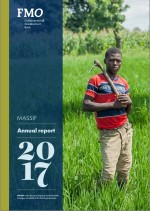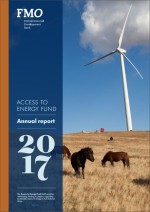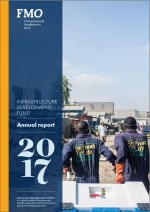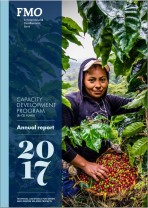For many years FMO has managed the Dutch government funds MASSIF, AEF and IDF. With these funds we can invest early on, taking high risks, and by doing so catalyzing new investors, including FMO. During 2017 we outperformed the EUR 100 million target for new commitments of these funds.

Set up in 2006 and managed on behalf of the Dutch Ministry of Foreign Affairs, MASSIF is FMO’s financial inclusion fund. MASSIF enhances fnancial inclusion for micro-entrepreneurs and small- and medium-sized enterprises (MSMEs) that are disproportionately affected by a lack of access to fnancial services. The Fund supports intermediaries that reach out to MSMEs in fragile and low-income countries, MSMEs in rural areas and those dependent on agriculture, women-owned MSMEs, and intermediaries providing access to productive goods and services for base-of-the-pyramid individuals.
As one of the world’s largest investors in the financial inclusion space, MASSIF has always been at the frontier of impact investing paving the way for other investors. Partnerships are crucial when addressing financial inclusion and will be a focus going forward, reachingout by strengthening and establishing relations.

The Access to Energy Fund (AEF) has was set up to actively support the creation of sustainable access to energy in developing countries by providing risk bearing funding; equity, subordinated loans, local currency loans and to a limited extent convertible grants. The goal of the fund is to provide access to energy to at least 3 mln people. To reach this goal, € 70 mln worth of funding has been made available by the Dutch Ministry of Foreign Affairs. Since December 2012, the fund has been focusing solely on Sub–Saharan Africa, specifcally targeting affordable, clean and renewable energy solutions, both on-grid and off-grid.
The off-grid sector is growing rapidly, both in size and importance. The sector continues to be a high-risk sector to finance and commercial investments are far from the required level to meet the demand in developing countries. Recent studies have shown a strong correlation between access to electricity and a wide range of macro- and socio-economic indicators, such as gross national income, life expectancy, maternal and childhood mortality, gender equality and educational excellence.

The Dutch Ministry of Foreign Affairs and FMO established Infrastructure Development Fund (IDF) in 2002 to support private investments in infrastructures in developing countries. IDF is a critical enabler of transformation, bringing countries’ development paths towards greater sustainability by enabling social and economic growth. By acting as frst mover and by offering risk capital to make projects bankable, IDF catalyzes private parties willing to invest at fnancial close or at a later stage. The IDF fnances infrastructure projects that can make a signifcant impact on socio-economic development in developing countries.

In July 2015, the Ministry of Foreign Affairs granted FMO a subsidy of € 4,95 million for its Capacity Development Program. This Program strives to intensify private sector development through knowledge transfer and make use of networks to share lessons. The Program focuses on two themes: Green & Gender.





